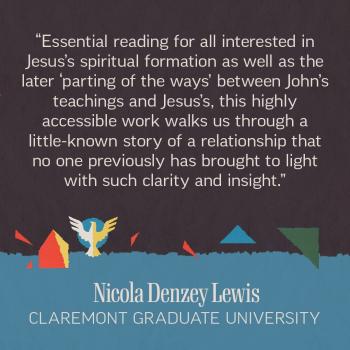By the Rev. Sam Alexander
 Our creeds agree; if it's not Trinitarian, it's not Christian, which is odd when you consider that we Christians pretty much ignore the Trinity. Why? Frankly, the doctrine doesn't make sense, which is probably good because you can't make arrogant theological claims if you don't comprehend God, which is probably why we ignore it. (Just guessing.)
Our creeds agree; if it's not Trinitarian, it's not Christian, which is odd when you consider that we Christians pretty much ignore the Trinity. Why? Frankly, the doctrine doesn't make sense, which is probably good because you can't make arrogant theological claims if you don't comprehend God, which is probably why we ignore it. (Just guessing.)
To "understand" Trinity we need to examine its roots. Christianity was derived from Judaism when various social forces sought a more universal expression of their beautiful and imaginative, monotheistic faith. (With those roots, how can we possibly lay claim to an exclusive grasp on truth?)
That said, the early Christians experienced God in three ways. Taken together, their scriptures described God as "Father," the one from whom all things proceed, and as "Son," the incarnate expression of God, and as "Holy Spirit, "in whom we live and move and have our being" (Acts 17:28).
But, and this is key, because Christianity derived from monotheistic Judaism, we did not posit three gods. Instead, we paradoxically believe that each distinct "person" is the whole of God. Whatever is said about one "person" must also be said of all three. (The Nicene Creed is a classical expression of the Doctrine of the Trinity.)
Taking the three persons together we get an image of one God in an imaginative, generative dance, moving into union. This is God's nature, and it is expressed in God's engagement with creation. God desires union with us precisely because God is God.
Trinitarian belief offers three "access points" into divine life, which is great because some are drawn to one and not to others. Each of those access points leads into the whole of God. (This is a distinctive, but not necessarily unique perspective of Christianity.)
Christianity has tended to emphasize an "I-Thou" relationship to the incarnate "Son." But when that entry point does not also lead into the whole of God we become disconnected from God's generative power, and separated from all that is.
Modernity challenges the veracity of myth and so this "second person" relation to "the Son" is called (unnecessarily) into question. That's why mainline churches are emptying.
In view of that, many Christians are seeking union with the "first person," the one from whom all things proceed. We are rediscovering the contemplative streams of our tradition. But when that entry point does not also lead into the whole of God, we become disconnected from one another; faith becomes otherworldly, without basis for ethics.
The final entry point seems to me most apt for the modern mind. When we study the cosmos, contemplating its enormity, complexity, and beauty, until it almost shimmers with the life of God, we are engaging Holy Spirit, the one in whom we live and move and have our being. But when this entry point does not lead us into the whole of God, when we do not enter into relationship with it, or unite with the generative power that creates it, then we become entirely focused on this world and lose any sense of purpose.
Well there it is, the Trinity. If your head is spinning, you've got it.
 Rev. Sam Alexander is Pastor of First Presbyterian Church of San Rafael, California. He holds a B.A. from Sarah Lawrence College, and an M.Div. from Union Seminary in Virginia. Sam has served congregations in Maryland and in the San Francisco Bay area and serves as an Adjunct Instructor in Homiletics (Preaching) at San Francisco Theological Seminary. He blogs at www.gracecomesfirst.net.
Rev. Sam Alexander is Pastor of First Presbyterian Church of San Rafael, California. He holds a B.A. from Sarah Lawrence College, and an M.Div. from Union Seminary in Virginia. Sam has served congregations in Maryland and in the San Francisco Bay area and serves as an Adjunct Instructor in Homiletics (Preaching) at San Francisco Theological Seminary. He blogs at www.gracecomesfirst.net.
2/16/2010 5:00:00 AM




